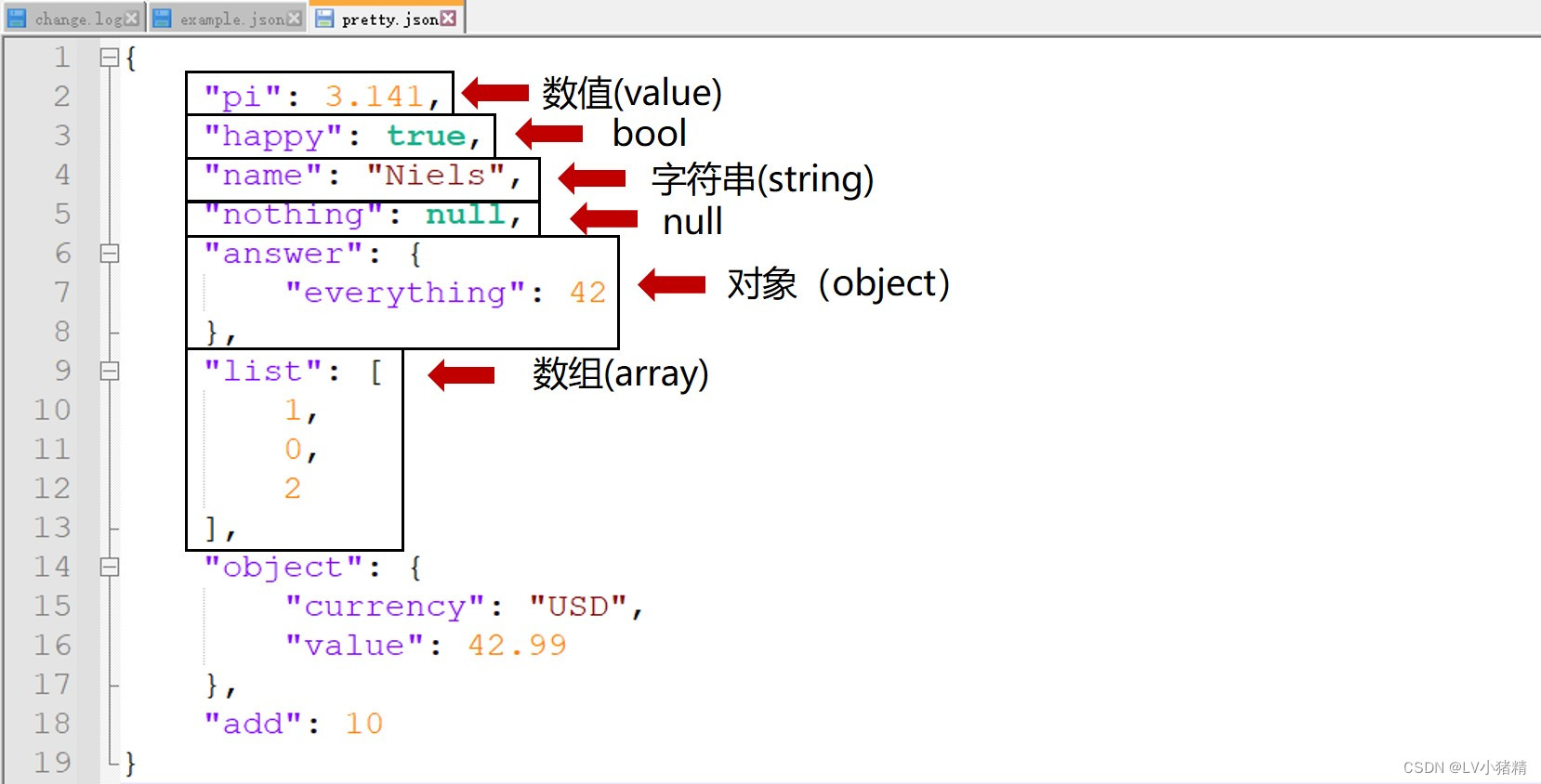使用 nlohmann 解析 json 文件
nlohmann 是德国工程师,以其名字为工程名的 nlohmann/json 项目又被成为 JSON for Modern C++。
github文件:https://github.com/nlohmann/json#read-json-from-a-file
nlohmann/json的配置
只需在需要使用的文件中#include“json.hpp”
C++含义
.hpp,其实质就是将. cpp的实现代码混入. h头文件当中,定义与实现都包含在同一文件,则该类的调用者只需要include该hpp文件即可,无需再
将cpp加入到project中进行编译。
json基本数据结构

给出相应的json文件
//example.json
{
"pi": 3.141,
"happy": true,
"name": "Niels",
"nothing": null,
"answer": {
"everything": 42
},
"list": [
1,
0,
2
],
"object": {
"currency": "USD",
"value": 42.99
},
"add": 10
}
json文件的读取、构造与输出
#include<iostream>
#include<nlohmann/json.hpp>
#include<fstream>
using json = nlohmann::ordered_json;//这边为按照json文件的实际内容顺序读取
using namespace std;
void main()
{
//读取方式1
std::ifstream f("example.json");
json data = json::parse(f);
//读取方式2
std::ifstream i("example.json");
json j;
i >> j;
//构造方式1
json j;
j["pi"] = 3.141;
j["happy"] = true;
j["name"] = "Niels";
j["nothing"] = nullptr;
j["answer"]["everything"] = 42;
j["list"] = {
1, 0, 2 };
j["object"] = {
{
"currency", "USD"}, {
"value", 42.99} };
//构造方式2
int num = 42;
json j2 = {
{
"pi", 3.141},
{
"happy", true},
{
"name", "Niels"},
{
"nothing", nullptr},
{
"answer", {
{
"everything", num}
}},
{
"list", {
1, 0, 2}},
{
"object", {
{
"currency", "USD"},
{
"value", 42.99}
}}
};
j2["add"] = 10;
//输出
std::ofstream o("pretty.json");
o << std::setw(4) << j2 << std::endl;
}
C++对象与nlohmann::json对象的转换
定义结构体
struct Player{
string name;
int credits;
int ranking;
};
C++对象转换成nlohmann::json对象
void to_json(nlohmann::json& j, const Player& p)
{
j = json{
{
"name", p.name}, {
"credits", p.credits}, {
"ranking", p.ranking} };
}
nlohmann::json对象转换成C++对象
void from_json(const nlohmann::json& j, Player& p)
{
j.at("name").get_to(p.name);
j.at("credits").get_to(p.credits);
j.at("ranking").get_to(p.ranking);
}
序列化
反序列化
通过在字符串尾部追加 _json 来将 string 类型的字面值进行转化:
// create object from string literal
json j = "{ \"happy\": true, \"pi\": 3.141 }"_json;
// or even nicer with a raw string literal
auto j2 = R"(
{
"happy": true,
"pi": 3.141
}
)"_json;
如果不添加`_json`, 传递的string类型的数值不会被转化为。
当然,也可以直接显式的进行
```c++
// parse explicitly
auto j3 = json::parse(R"({"happy": true, "pi": 3.141})");
序列化
将json格式的对象转化为string类型的字符串:
// explicit conversion to string
std::string s = j.dump(); // {"happy":true,"pi":3.141}
// serialization with pretty printing
// pass in the amount of spaces to indent
std::cout << j.dump(4) << std::endl;
// {
// "happy": true,
// "pi": 3.141
// }